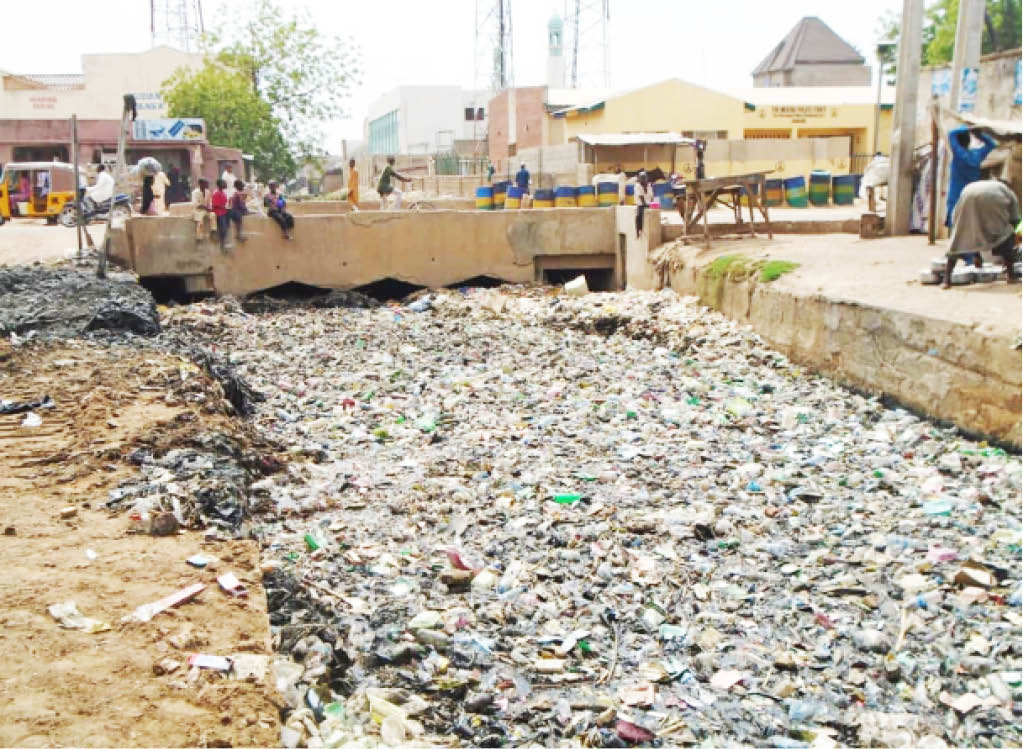How poor refuse management increases flooding in Kano
While Kano metropolis has witnessed a lesser occurrence of flooding in this year’s rainy season compared with previous years, several areas within the state metropolis continue to battle with the effect of the perennial rainfall. Areas such as Shagari Quarters, Janbulo, Kabuga, Rijiyar Zaki, Wailari, Chiranci, Dorayi, Hotoro, parts of Zaria road among others have […]

A major water way in Kano before it was cleared by the Ministry of Environment
While Kano metropolis has witnessed a lesser occurrence of flooding in this year’s rainy season compared with previous years, several areas within the state metropolis continue to battle with the effect of the perennial rainfall.
Areas such as Shagari Quarters, Janbulo, Kabuga, Rijiyar Zaki, Wailari, Chiranci, Dorayi, Hotoro, parts of Zaria road among others have had several bouts of floods this year.
The Chairman of the State Emergency Management Agency (SEMA), Sale Aliyu Jili, had specifically identified Kano Municipal among the local governments in the state where flood had destroyed houses and other properties worth over N50 million.
Kano/Jigawa Chronicle findings revealed that improper dumping and poor management of waste in the metropolis are contributing immensely to flooding as there are no drainages in some areas and where they exist, they are blocked by the indiscriminate refuse disposal by the residents.
The state government, as part of measures to have a clean environment, designated every last Saturday of the month as a general sanitation day with restricted movement imposed across the city from early morning until 10am.
A resident of Sani Mainagge, Malama Amina Ali blamed her community for the flood they experienced penultimate week.
She said, “We experienced flood because not all of us are responsible residents. We lack the sense of duty to be environmentally-conscious, to treat our communities as we do to our personal houses. We allow children to take garbage out without knowing where to dump it. They will dispose of it anywhere they feel like and whenever it rains, the garbage will go back into our drainage and block the waterways.”
For Sulaiman Sulaiman, a resident of Tudun Murtala, both the government and the residents are responsible for poor refuse management in the city.
Alhaji Habibu Muhammad of Naibawa area said with the carefree attitude of the people, whenever there was heavy rainfall, especially overnight, the drainage system often gets blocked by waste dumped into them by the people of the area.
But Alhaji Auwalu Musa, a resident of Tudun Yola, said his area did not experience any threat of flooding because they provided refuse bins in front of each house in the quarters.
“We have registered with a private firm that collects our refuse on daily basis and we are paying for the services monthly,” he added.
We’ve cleared major drainages – KSNG
The Commissioner for Environment, Dr. Kabir Ibrahim Getso, said that in a bid to free Kano from flooding in this year’s rainy season, the government had cleared all major drainages in the state.
Getso said that during the exercise, they were able to evacuate more than 1,000 trucks of waste from different dumpsites in the metropolitan city.
“We started from Jakara River down to Kwarin Gogau in Fagge. We also cleared waste from drainages at Sharada Jaen, Dorayi, Chiranchi, Na’ibawa and along Yahaya Gusau road,” he said.
Years of neglect responsible – Waste management firm
The state government recently, in a Public-Private Partnership (PPP) arrangement, handed over waste management in the city to a private firm, Capegate Investment Limited, thereby scrapping its Refuse Management and Sanitation Board (REMASAB).
The Chief Executive Officer of the firm, Alhaji Bashir Namadina told Kano/Jigawa Chronicles that even though the firm was recently engaged, it had done a lot to clear heaps of waste from the city.
He said the problem with refuse management in the state was an accumulation of years of neglect.
According to him, in order to achieve the set target, the company had employed over 2,000 workers and purchased some equipment to be able to reach the required environmental standard, assuring that Kano would be a refuse-free city by next year.
He, however, called on the Kano residents to take the responsibility of protecting their environment.
“The residents should change their attitude of dumping refuse anywhere”, adding that, going forward, the residents must pay for the management of their wastes.
